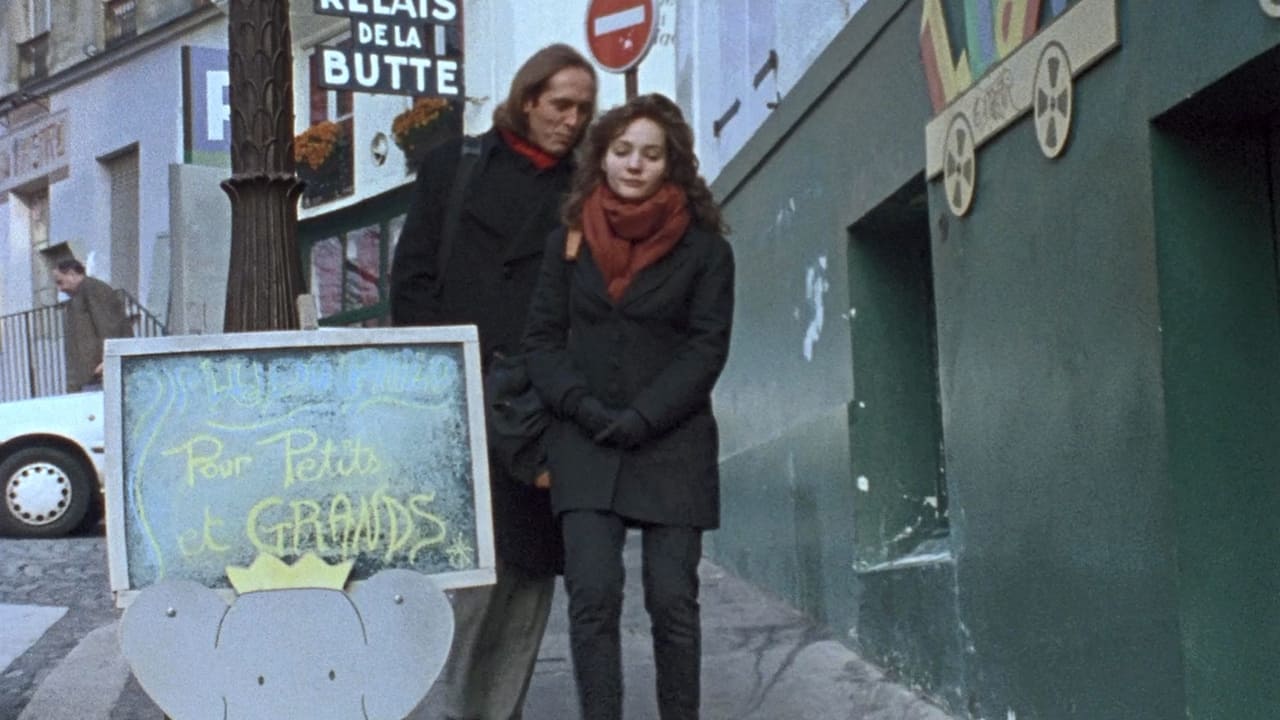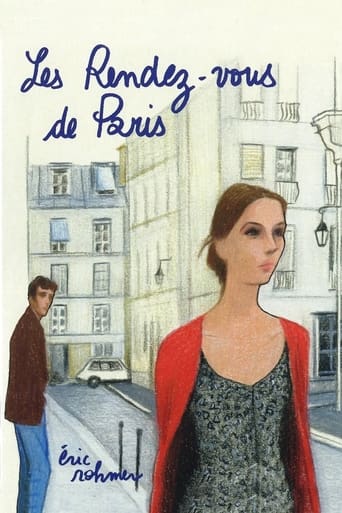TrueJoshNight
Truly Dreadful Film
Ameriatch
One of the best films i have seen
Lumsdal
Good , But It Is Overrated By Some
Tedfoldol
everything you have heard about this movie is true.
valadas
Eric Rohmer usually explores with exceptional psychological talent what is in the minds and hearts of ordinary people in what concerns love relations. In his movie people reflect and talk thoroughly about what they feel (or suppose they feel) in what regards those relations and live apparently superficial events although very meaningful and sometimes unexpected and surprising. In this movie the first two stories are about love and infidelity treated in a humorous way without prejudice of their psychological depth. Human beings are like that and they not always realize what they really feel. The third story is of love and infatuation, of illusion and disillusion when you think that because you love someone, automatically the loved one also loves you which seldom is true. The city of Paris atmosphere where the three stories take place is particularly favourable to such sentiments and situations for its romantic urban environment. We have then here the usual Rohmer's characters: authentic human beings somewhat doubtful about their feelings and thoughts (though they sometimes suppose they are certain about that) who now and then have to face situations for which they were not prepared. Not very dramatic but not superficial anyway.
raskimono
What is love? and can you explain it. Using three meetings at different locations , Rohmer creates a parable on the intricate and surprising nature of love. The first story about a rendezvous at seven is the best. Insidious in its nature, it plants the seeds of doubt that blossom into the tale of two women and two men, each seeking and expecting divergent results. Filled with coincidences, all three tales are, it presents the surprises we don't see coming.The second story which is kind of dull or more demanding depending on taste, follows a couple meeting up in many public locations. The female character is afraid to meet in private despite the urgings of her male lover and when she does make the leap, the consequences will forever change the relationship.The goat of the pack is the final vignette, a story titled after a Picasso painting that features prominently in story. Again the obvious is pushed aside for the unexpected and there is a certain breezy, plush ending to the proceedings that seems to jar with what has become.A comedy in three parts, there is a chorus group that is interspersed and opens each story. Cherubic in nature, the songs present certain adages on the nature of love and life.A mixture of his moral tales with his comedies and proverb series, it is the lesser of each but sub-par Rohmer is still superior to most filmmakers. His low frills style of film making which a previous reviewer called cheap tells him how little he knows about the edict of the French New wave, the only die-hard adherent remained Rohmer, his rules, a quantifier closer to the Dogma'95 tradition of cinema. It is cinema of the heart at its finest.
writers_reign
... in lover's meetings as Feste tells us in Twelfth Night and Rohmer appears to have taken this as his starting point. Rather surprisingly it is relatively late in the canon, now some twelve years old it feels more like the stuff he was turning out forty years ago. Essentially this is our old friend the portmanteau movie, three films for the price of one. In this case love/romance is the recurring motif and none of the three stories is resolved satisfactorily. In the opener a girl who is very much in love discovers that her boyfriend is cheating on her; in the second, a girl is living with a man with whom she has fallen out of love and seeing, though not sleeping with, a second man. About to become the lover of the second man she realizes that her supposedly dull live-in lover is enjoying an assignation - whilst supposedly out of town - at the very hotel which she has selected for her own romantic rendez-vous whilst in the third a painter who has been 'fixed up' with a Swedish girl abandons her when he forms an instant attraction to a girl he sees in the street, who turns out to be newly married.Rohmer's interest seems to be in turning over rocks and observing what kind of creatures scuttle from under them; he will follow them for a while and then leave them to find their own way back or not, as the case may be. As often with Rohmer a great deal of the pleasure is in seeing Paris in all its aspects. It probably won't convert anyone who isn't already a fan but neither did this, the tenth Rohmer film I've seen, make me resolve to give up on him.
zetes
A nice Rohmer film. Fans of his work will like it a lot, and it's not likely to win over any non-lovers or even newbies. I'm a big fan myself, so it won me over effortlessly. I'd rank it lower than most of the Rohmer films that I've seen, but, then again, I've never disliked one of his films and most of them I absolutely adore. Rendezvous in Paris is made up of three short stories about near-affairs in Paris. The first, "Rendezvous at 7 O'clock," is about a young woman who finds out that her boyfriend sees other women. Through a set of amazing circumstances, she meets his other girlfriend. The second, "The Benches of Paris," is the best. It is about a teacher who is trying to seduce a young woman whose relationship with her longtime boyfriend seems to be on the rocks. We watch them as they walk around the parks and other scenic areas of the French capital. The third, "Mother and Son 1907," is about a pretentious painter who comes up with elaborate philosophies about his love life. He is set to spend the weekend with a Swedish girl, a cousin of a friend, but, when he runs into a beautiful, young, and married girl outside of the Picasso Museum, he has to run after her. The acting is great, especially Aurore Rauscher, the woman in the second section of the film. Rohmer paints these relationships so perfectly; they seem so simple, but they are rife with complexities. Contemplating them makes my head swirl. 8/10.

